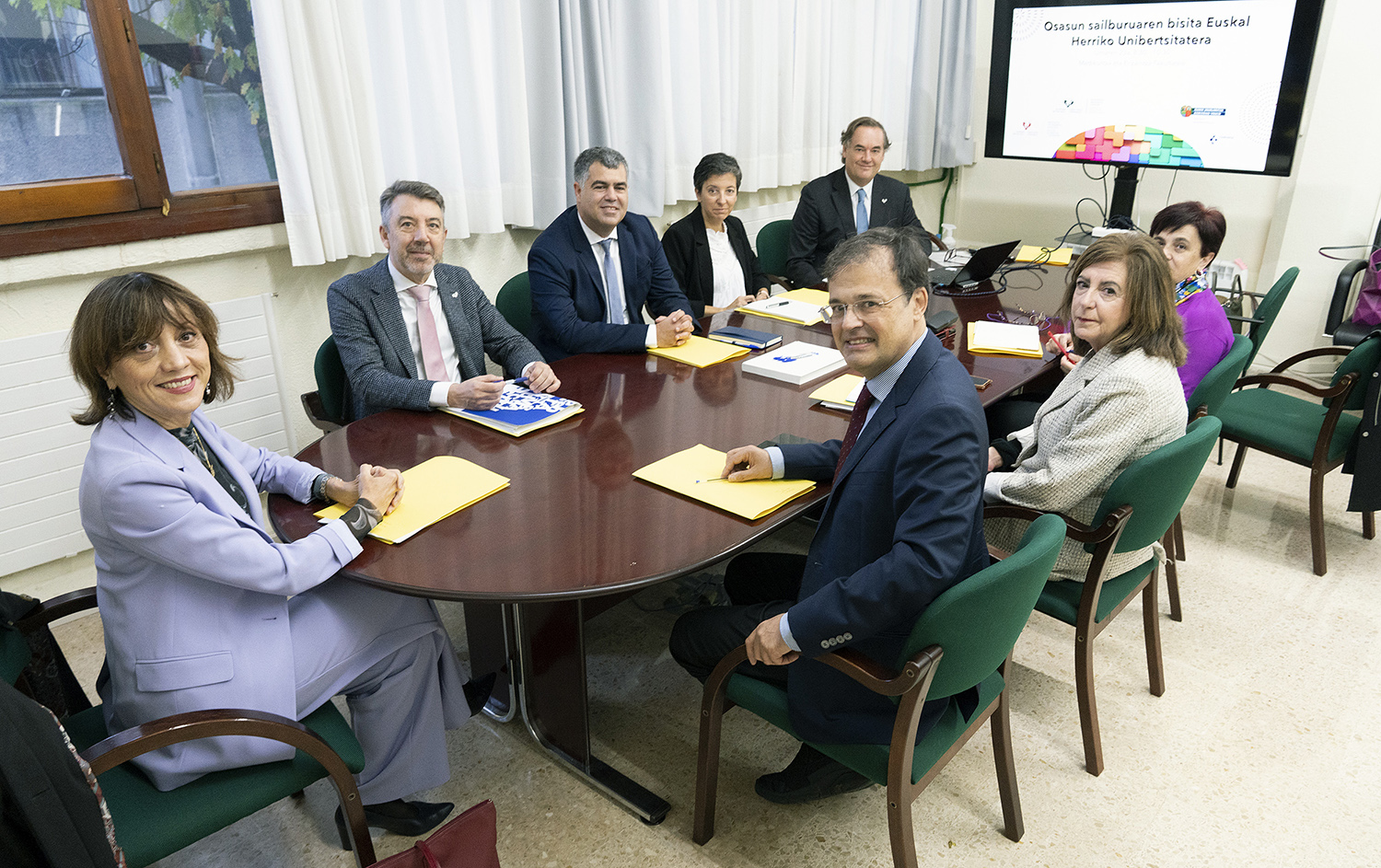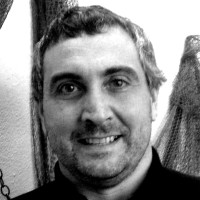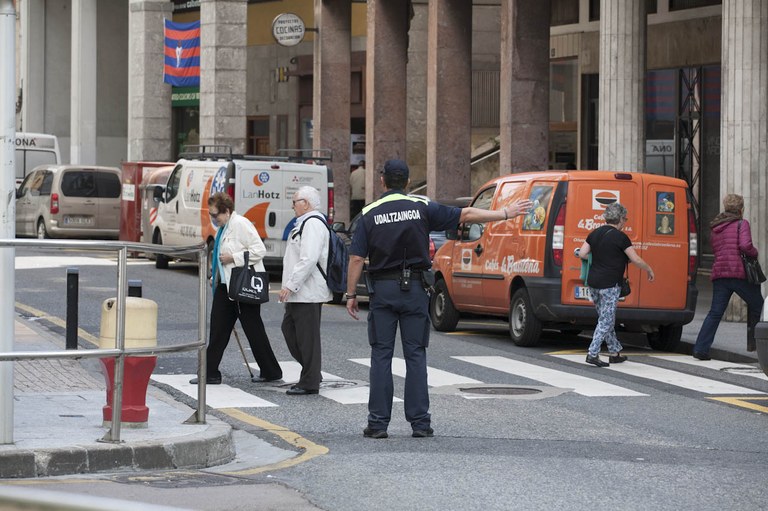How to Leverage Leaders to Influence Their Use
- The EraLan project was launched in 2006 by the Cluster of Sociolinguistics. Currently, the project consists of eleven entities. In organizations of the world of work (private and public), they study and test how to influence Euskaldunization through linguistic leadership. Your hands include the following questions: What socio-linguistic knowledge would the Basque technician need in order to be able to influence from the leadership in the companions and politicians of the city? Why is it important for the mayor or employer to speak in Basque?

Let's start to dig deeper into the EraLan project through an example. Izaskun is the director of a private company; she is Euskaltzale, she is a student of the ikastola, and she speaks a lot in Euskera in her day to day. In the General Assembly of the Working Centre, it is always done in Spanish. There has never been talk in Basque in the assemblies and he has not proposed any change either. Izaskun, for its part, is the leader in its field of work, as it is the leading company. He could be the leader of the language if he prepared for it. EraLan focuses on giving these social leaders tools that allow them a critical linguistic view of what happens in this work environment with linguistic habits. The transformation will occur after empowerment. Without this work, they will continue as usual, in Spanish in the assemblies.
The EraLan project brings together both branches, theory and practice. Consideration is being given to what linguistic leadership is and direct interventions have been made in the processes of Euskaldunization of the administration and private companies. In the documentary, different realities of the City Hall, the Council or the company have been analyzed, and they have worked with political leaders, Basque technicians and directors of the administration.
Leaders to face subordination
Leadership has a thousand meanings. The sense that EraLan has chosen is very much related to transformation. As a linguistic community, the Basque individual lives in a situation of subordination or minorities. The goal is to drive transformation through leadership. Although as a speaker he is in a situation of subordination, everyone has the capacity to change something. To immerse yourself in change you must feel the need. It also needs tools to bring about change. The entrepreneur, with a favorable attitude towards the Basque country, should be aware of the importance of doing so in the general assemblies. Then comes the second step, how do you manage to change your habits forever?
Nekane Goikoetxea is a member of the Sorgunes research centre (HUHEZI, Mondragon Unibertsitatea) and director of EraLan. Rather than looking at the end result of the process, it indicates that it is more important to analyze the changes that have occurred in the investigative action process. It's not easy to change the never-ending habits. It requires the transformer, the leader of the language, a critical view from the socio-linguistic point of view, a prepared discourse.
In recent times, Goikoetxea has told us of the need for a new framing (or framework) that is being proposed by the Alavese sociolinguist Iñaki Martínez de Luna. The question is within what framework we place the problem or the situation of the language. Then we act within that framework. In the opinion of Goikoetxea, the framework we now use is often constructed from the point of view of the hegemonic spasmodic languages, we start from the framework of the other and generate our framework, our discourse, our reaction. It would be an exercise of resistance, for example, to reinterpret relations with the hegemonic language.
In the opinion of Nekane Goikoetxea, we are very restrained in the speeches and arguments: “Many times we go with the same kind of discourse to the institutions that have chosen or are going to adopt the path of Euskaldunization. But each one (be it a company, a city council or a political party) has its own framework and in it places the language. It is the job of the Basque professional to work speeches adjusted to each of them. We often go with simple speeches, we don't start arguing, we don't integrate the other's vision. We are in the need to work the discourse, the Basque professional has to make a critical look, enrich the discourse, have the ability to manage the relations of power and the strategies of transformation. We ask the technician for rigorous work.”
As for unprepared speeches, Goikoetxea has given us an example of a leading leader, moving from the Basque technicians to the political leaders. The president made an exemplary journey: he learned Basque, uses it without shame, has euskaldunized many relations in Spanish. However, if you are asked why you have made this change, it is difficult for you to make a socio-linguistic reflection on this practice, and the answer is as follows: “For love for the Basque people, for love for the people.” According to Goikoetxea, the politician has learned Basque, but has not done the socio-linguistic work corresponding to a leader of the first level, has no elaborated speech, and it is noted that in his professional career the Basque (not the use, but the discourse) has not had centrality. “We know – says Goikoetxea- that many authorities give the Basque as much importance as a good suit, but many cases are different, they are authentic language leaders. But they don't have a hard socio-linguistic perspective. This is undoubtedly related to the lack of structuring of sociolinguistics. It’s amazing for a community that has made this journey in 50 years.”
Guardiola, vertex of the iceberg
In the normalization of Catalan, Pep Guardiola, former coach of the Club Barcelona, has shown an exemplary attitude; he is an example of what is the leader of the language. We've asked Nekane Goikoetxea about the linguistic attitude of the trainer that we've seen almost every day in the media until yesterday: “It’s the vertex of the iceberg. In it we have seen the way to make a powerful transformation. Two things coincide. On the one hand, the Guardiola himself is a phenomenon and, on the other, the club has probably worked on the linguistic perspective, as it is aware of its symbolic power. It has had the strength to transform the entire media system. In addition, it has given Catalan a status that it has not had until now in some forums of Catalan society. He has had resistance from the monolingual power and has responded in a very transformative way (raised, sophisticated).” Leader, very strong, but it has put us back to value the role of the structure, in this case the football team. In other words, on the road to Euskaldunization, it is difficult for the Basque technician, the director of the company or the politician to take steps, if at home the Basque country is not in the centre.
Goikoetxea sees a contradiction in the Administration’s plans for Euskaldunisation: “The authorities have remained out of the way of the Euskaldunization that has been given in our administration, the planning times have hardly affected them. The current institutional crisis highlights these contradictions. Would it be possible, for example, to ban workers from smoking and not the authorities? The importance of formal social leaders is great.”
This article refers to EraLan’s work in management and the business world, but it is also working in the complicated field of media. The public hearings and press conferences are studying how to deal with the difficulties of using Euskera as much as possible. For example, how can an organisation’s media officer act when he or she has to go to the media? If you decide to speak in Basque and find resistance, how will you respond to them? What's behind those resistances? What kind of leadership can there be among Basque journalists?
After all, the media tend to be a brake between social leaders and citizens, and from their windows are built the leaders in Basque Model and not so exemplary.
Olano Gipuzkoako Batzar Nagusietan EAJ taldearen bozeramailea da. Aurreko legealdian Foru Aldundiko diputatu nagusi izan zen eta orduan ezagutu zuen EraLan proiektua, parte hartu baitzuen.
Zer garrantzi dauka diputatua edo batzarkidea euskaraz aritzeak?
Bi bektore nagusi daude; bat etxera begirakoa. Ardura instituzionala baldin badaukazu, nik aurreko legealdian neukan bezala, talde politikoa eta funtzionario taldea dauzkazu. Ez dugu ahaztu behar Gipuzkoako Foru Aldundiak 2.000 langile dauzkala. Euskararen erabilera indartzeko, horiei begira zuk eragin dezakezu.
Bigarren bektorea komunikazio publikoarena da, nola aritzen zaren euskaraz gizarteari begira. Ez dira euskararen inguruko hitz politak bakarrik, ideiak, baizik eta praxia, eguneroko dinamika. Daukazun arduraren arabera, eragina oso garrantzitsua izan daiteke.
Nola eragin dezake agintari politikoak?
Euskal politikagintzan gertatu izan zaigu funtzionario taldea, udalean edo erakunde handiagokoan, euskalduna izatea eta arduradun politikoarengatik eguneroko jarduna gaztelaniaz egitea. Izan daiteke politikariak ez daukalako euskaraz erraztasunik, euskaraz egiteko ohiturarik ez daukalako... Alegia, eduki dezakezu esparru bat ia euskalduna, baina erdaraz funtzionatzen duena, inertziaz. Arduradun politiko batek hori puskatzeko eragin dezake. Kontrakoa ere egin dezake.
Zer gogoratzen duzu EraLanetik?
Perfil diferentetako jendea biltzen zen eta bakoitzak bere ekarpena egiten zuen, hausnarketa partekatua zen. Euskalduntzea ez da publikoari begira egin beharreko gauza bakarrik, norberak administrazioko eguneroko lanean egin dezake. Euskalduntzea martxan jartzeko orduan irizpide politikoa inportantea da, baina arduradun politikoak ezin du bere kasa asko egin.
Inertziak puskatu beharraz hitz egin duzu eta norberaren kontzientziaren indarraz.
Bikoteak umearen aurrean erdaraz hitz egiten baldin badu, ezin dio esan euskaraz hitz egiteko, ez da sinesgarria. Lehenengo obligazioa da euskara hizkuntza nagusi moduan erabiltzea zure esparru zuzenean, eta zirkuluak zabaltzen doazen neurrian, zure lehenengo hitza euskaraz egitea. Horrek euskalduntzea dakar, inertzia aldaketa. Azkenean, administrazioan eta esparru guztietan harreman pertsonala dago eta harreman hori euskalduntzea oso inportantea da. Dena dela, ez da aski. Dinamika administratiboa ere hor dago eta erdaraz egiteko ohitura badago...
Eman iezaguzu adibideren bat.
Oker ez banago euskara hutsean funtzionatu zuen lehenengo diputatu kontseilua izan ginen. Horretarako gaitasuna geneukan. Batek ez zuen euskaraz egiten, baina ulertu bai. Bada, hark gaztelaniaz egiten zuen, baina beste guztion hizkuntza baldintzatu gabe. Inertzia baten haustura izan zen, eta ekarpena. Horrek ez dakar erabateko aldaketa, baina urrats garrantzitsua da aldaketa eman dadin.
Diskurtso aldetik nola zabiltzate administrazioko agintariak eta langileak?
Foru Aldundiaren barruan adibidez, euskararekiko ardura, diskurtsoa eta sentsibilitatea arduradun politiko batzuek zeukaten, eta gainontzeko guztiek ez zuten bere egiten ardura hori. Ez zegoen transbertsalitaterik. Nahi baduzu, funtzionamendua bertikala zen, ez horizontala. Arduradun bat zegoen eta hizkuntzari lotutako legedia zeukan administrazioan martxan jartzeko. Mundu osoaren kontra borroka egitea bezala da, besteek ez dutelako bereganatzen ardura. Gero, transbertsalitatearen kontzeptua barneratu genuen eta hainbat printzipio erakundearen egituran transbertsal bihurtu ziren, hala nola, genero berdintasuna, jasangarritasuna eta euskara.
Liderra eta nagusia ez direla gauza bera diozu.
Niretzat lidergoak ez dauka ikuspegi autoritarioa: nik agindu eta besteak obeditu. Lidergoa konfiantzan oinarritzen da, eta adimen emozionalean. Lan giro egokia edukitzen jakin behar duzu, harreman ona izaten. Euskararen erabilera ez da agintzen, liderra izango zara baldin eta etsenplu ona ematen baduzu. Liderra eta nagusia ez dira kontzeptu bera.
Hedabideetan nola jokatu behar du liderrak?
Galdera inportantea eta zaila da, urte piloan obsesionatu nau gai horrek. Arlo politikoan, euskaldun garenok egiten dugun irakurketa da komunikazioa euskara hutsean egiten duzunean hautsak harrotzen direla.
Hautsak harrotu?
Adibidez, prentsaurrekoan komunikazio alorreko profesionalari euskara hutsean egiten badiozu, harentzat erasoa da, konturatzen da profesionalki zerbait falta zaiola. Askotan ez daude prest profesionaltasun falta onartzeko.
Beraz, nola jokatu?
Derrigorrean gaztelania erabiltzera eramaten zaitu horrek. Euskara hutsean egiten baduzu gaztelania hiztun profesionala etorriko zaizu eta esango dizu, “errepikatuko mesedez erdaraz?”. Euskal kazetariak arazo bera dauka, komunikazioa erdaraz egiten denean etorri eta, “emango didazu kortea euskaraz?”. Eguneroko dinamika hori da. Dena dela, katalanek edo ingelesek haien hizkuntzan egiten badute, gaztelaniazko medioetan itzuli egiten dute edo azpititulatu. Euskaraz zergatik ez? Zergatik behartzen nau euskara ez dakienak erdaraz egitera? Profesional guztiek elebidun izan beharko lukete eta medioek jakin beharko lukete nire prentsaurrekoetara euskalduna bidali behar dutela.
Baina, egoera diglosikoa aldatzen saiatzen bazara jendea haserretu egiten da. Nire asmoa euskara hutsean egitea zen, baina gero errealitatea dago. Oraingoz ez da posible euskara hutsean egitea. Orain euskarari espazio duina ematen diot; dena euskaraz, testuingurua eta kazetariarentzako interesekoa den kortea, eta gaztelaniaz kortea baino ez. Edozein kasutan, euskararen eboluzioa nabaria da, orain egiten dena ez da betelana. Hala ere, ez dakit egin beharreko guztia egin genuen aurreko legealdian.
Sare sozialetan zabiltza.
Ez daukat argi nola funtzionatu, praxi diferenteak daude. Ezagun batek izen desberdinak dauzka eta kontu bat euskaraz eta beste bat gaztelaniaz. Ez zait gaizki iruditzen. Nik berriz, kontu bakarra daukat eta gaztelaniazko eta euskarazko mezuak orekatzen saiatzen naiz. Azken finean, eragile zara eta erdalduna den gunea euskalduntzen saia zaitezke.
Euskararen kontrako erasoak gaitzetsi izan dituzu.
Jarrera publikoa inportantea da eta Twitterren eta Facebooken bidez oso erraza daukazu. Lidl supermerkatuak etxeko buzoian astero sartzen duen publizitate liburuxkarekin asko haserretu nintzen. Hitz bakar bat ere ez euskaraz. Publikoki esan nuen ni ez nintzela joango Lidlera erostera, euskararen trataera aldatzen ez bazuten.
Beste batean, Kontxako Banderaren bueltan, Radio Nacionaleko Ramon Trecet esatariak tweet bat sartu zuen esanez, ikaragarri poztu zela Donibaneko patroia erdaraz hizketan entzun zuelako, aurrerapausoa zela. Esaldi hura arbuiatzen nuela adierazi nuen Twitterrez.
EraLan ikerketa-proiektua da. Soziolinguistika Klusterra da sustatzailea, Mondragon Unibertsitateko HUHEZI fakultateak zuzentzen du, eta hainbat erakunderen arteko lankidetzaren bitartez gauzatzen da. Lan-arloan ematen den hizkuntzen erabilera da proiektuaren aztergai nagusia, eta ikerketa aplikatua eta haren gaineko hausnarketak elkarrekin egiten dituzte partaideek.
Proiektua 2006an jarri zuten abian eta 2012-2013 urteetan hirugarren fasea landuko dute. Hiru azpi-talde ari dira hainbat gai jorratzen: a) hizkuntz lidergoa administrazioko erabilera planak berritzeko; b) hizkuntz lidergoa prentsaurreko eta agerpen publikoetan c) euskararen aldeko portaera aktiboak erakundeen kulturaren argitan.
Ondorengo erakundeek, EraLaneko parte-hartzaileak izateaz gain, euren etxeetan egin dituzte hizkuntza lidergoari lotutako interbentzioak.
- Bermeo, Eibar, Zumaia, Portugalete, Lasarte-Oria eta Donostiako udalak, eta Bortzirietako mankomunitatea.
- Gipuzkoako Foru Aldundia.
- Kutxabank.
- Bai Euskarari Ziurtagiri elkartea.
- Bertsozale Elkartea.
- Kontseilua.
- Topagunea.
- Gasteizko Legebiltzarra.
- Emun / Elhuyar / Aek-Ahize / Artez aholkularitzak.
Bermeoko Udalean EraLan proiektua gauzatzen ari dira. Idurre Bideguren aurreko legegintzaldian zinegotzi izan zen eta orain alkate da. Egitasmoa zuzen-zuzenean bizi ez badu ere, badaki zertaz ari den.
Alkatea zara, lider beraz. Hizkuntz liderra izan zaitezke udalean bertan, eta herriari begira ere bai.
Lider eraldatzailearen kontua oso kontzeptu konplikatua da. Horra iristeko gaitasun asko izan behar dituzu. Lehenengo galdera: Lider sentitzen al zara? Ez, momentuz ni ez naiz lider sentitzen, nahiz eta rol bat betetzen dudan eta lidergo maila bat badaukadan. Liderrak gaitasun asko eduki behar ditu: komunikatzeko gaitasuna, motibatzekoa... Horiek lantzen ari gara, baina bada beste gauza bat oso garrantzitsua: udal honen nondik norakoa. Lidergoaren gaian guk [udal politikariak] baino gehiago dakite langileek. Guk ezagutza hori eskuratu behar dugu lehenengo. Bestalde, eredu izan behar dugu eta horretarako hizkuntza ohitura batzuk erakutsi behar ditugu.
Ez da beraz, barneratzeko kontzeptu erraza.
Ez hizkuntz lidergoa, ezta lidergoa orokorrean ere. Lider izateko moduak daude. Modu bat izan daiteke “boterean gaude eta hemen guk esaten dugun moduan egiten da lan, euskaraz egiten dugu lan”. Beste modu bat izan daiteke euskaraz natural egitea, normaltasunera jotzea, inor erasotua sentiarazi gabe.
Zinegotzi lau urtez eta orain alkate. Euskarari dagokionez, zer aurkitu duzu udalean?
Sorpresa izan da. Oso erakunde euskalduna topatu dut. Ez luke sorpresa izan beharko, baina adibidez Bizkaian telefonoaren bestaldean euskaldunak aurkitzea ez da beti hain erraza eta dokumentuak euskaraz izatea ere ez. Bermeoko Udalean zati handi bat euskaraz egiten da, ahozkoan eta idatzizkoan; batzarrak, prentsaurrekoak. Ni natural nabil euskaraz eta taldea ere bai.
Lidergoaren gaia sakon landu dutenek esan dizuete ordea, natural euskaraz aritze hori ez dela hain naturala.
Bai, hala adierazi digute. Guri, udalean euskaraz egitea naturala iruditu arren, ez da hain naturala. Udalera nor datorren, erabilera ildo bat edo beste bat marka dezake, boterean dagoenaren arabera langileei eskatutako euskara maila txikiagoa edo handiagoa izango da. Dena dela, batzuetan hizkuntzaren erabileran markatzen den lerroa ez da argia, erabakitakoa, baizik eta asko pentsatu gabekoa.
Zuri gertatzen zaizu ohituraz gaztelaniaz aritzen direnek zurekin euskaraz egitea, alkatea zarelako?
Niretzako naturala zen, adibidez, halakorekin euskaraz egitea. Baina gero konturatu naiz beste jendeagaz gaztelaniaz egiten dutela. Langileek ikusten bazaituzte zure inguruan euskaraz zabiltzala, inportantzia puntua ematen diote. Hasieran ez nintzen gauza horietaz konturatzen.
Zer lantzen da lidergoan sakontzeko bileretan?
Aurreko saioetan alkatea eta zazpi bat zinegotzi elkartzen ziren. Haien kezkak agertzen zituzten, hizkuntza portaerak aztertu. Adibidez, euskaraz natural egiten duzu bileretan eta halako batean gaztelaniaz egiteko eskatu dizute. Nola jokatu?
Adibide zehatzen bat eman al dezakezu?
Etorkinen gaia lantzeko Ikuspegi erakundetik [Immigrazio Behatokia] hizlaria ekarri genuen. Hark euskaraz prestatu zuen hitzaldia eta guk ere bai aurkezpena. Saioa bukatzerako gaztelaniaz ari ginen denok. Hainbat jende etorri zen, batzuk etorkinak. Prestatu barik joan ginen, euskaraz egiteko prestatuta joan ginen. Aurreikusi egin behar da aurkituko duzun panorama. Euskaldunoi gertatzen zaiguna da gaztelaniaz badakigula, baita beste hizkuntzak batzuk ere, eta gaztelaniaz egiteko eskatzen zaigunean egin egiten dugula.
Hedabideetan nola egin ere aurreikusi behar duzue.
Prentsaurrekoak euskaraz egiten ditugu, batzuetan prentsa oharra egiten da gaztelaniaz. ETBn gaztelaniazko kortea eskatzen dute eta eztabaida izan dugu. Orain hasi dira euskarazko esanak azpititulatuta ateratzen. Baina euskaraz egiten baduzu ez zaituzte telebistan ateratzen edo zati bat baino ez, ez da gauza bera. Gaztelaniaz ematen badiozu dena prest daukate, lan handirik egin gabe. Zuk hor atera nahi baduzu, igoal gaztelaniaz egin behar duzu. Eztabaidatu egin behar dira horrelakoak.
Udaletik kanpora ere liderrak aurkitu behar direla diozu.
Kirol munduan adibidez. Urdaibaiko arraunlariei behin baino gehiagotan esan diet, Bermeoko trainerua izanda eta patroia euskalduna, zergatik esaten duen un-dos-tres-acaba eta ez bat-bi-hiru-akaba. Entrenatzaileari ere esan diot, eta hark: “galegoak ere badaude...”, eta euskaldunak ere bai! Hain zaila al da bat-bi-hiru-akaba ikastea? Gaztetxoentzat klabea da haien gustuko esparruan, kirolean, erreferentzia euskaldunak izatea.
Gasteizko 1 zenbakiko Auzitegi Kontentzioso-Administratiboak emandako epaia berretsi du EAEko Justizia Auzitegi Nagusiak. Lan poltsan parte hartzeko euskara maila altuenaren baliokide diren 3. eta 4. eskakizunak indargabetu zituen Gasteizko Auzitegiak.
In recent months I have had to work in a number of institutes and, at some point, I have had to talk to the students about the possibilities offered by the labour market. The typology of the students is varied and in the same city varies a lot from one neighborhood to another,... [+]
Languages Lan has just organised the first international conference on linguistic management in Bilbao. Much has been said in the Congress about language policy, management and tools. And emotions. And from emotions, how many cooperatives, companies and organizations in our... [+]
Few spend their whole lives at the same work. What was common at the time of our parents, today, is absolutely unusual. It seems that millennial generation youth will not spend five years in the same job and the time will be much shorter between Z and Alpha generations.
I too,... [+]







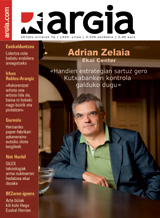

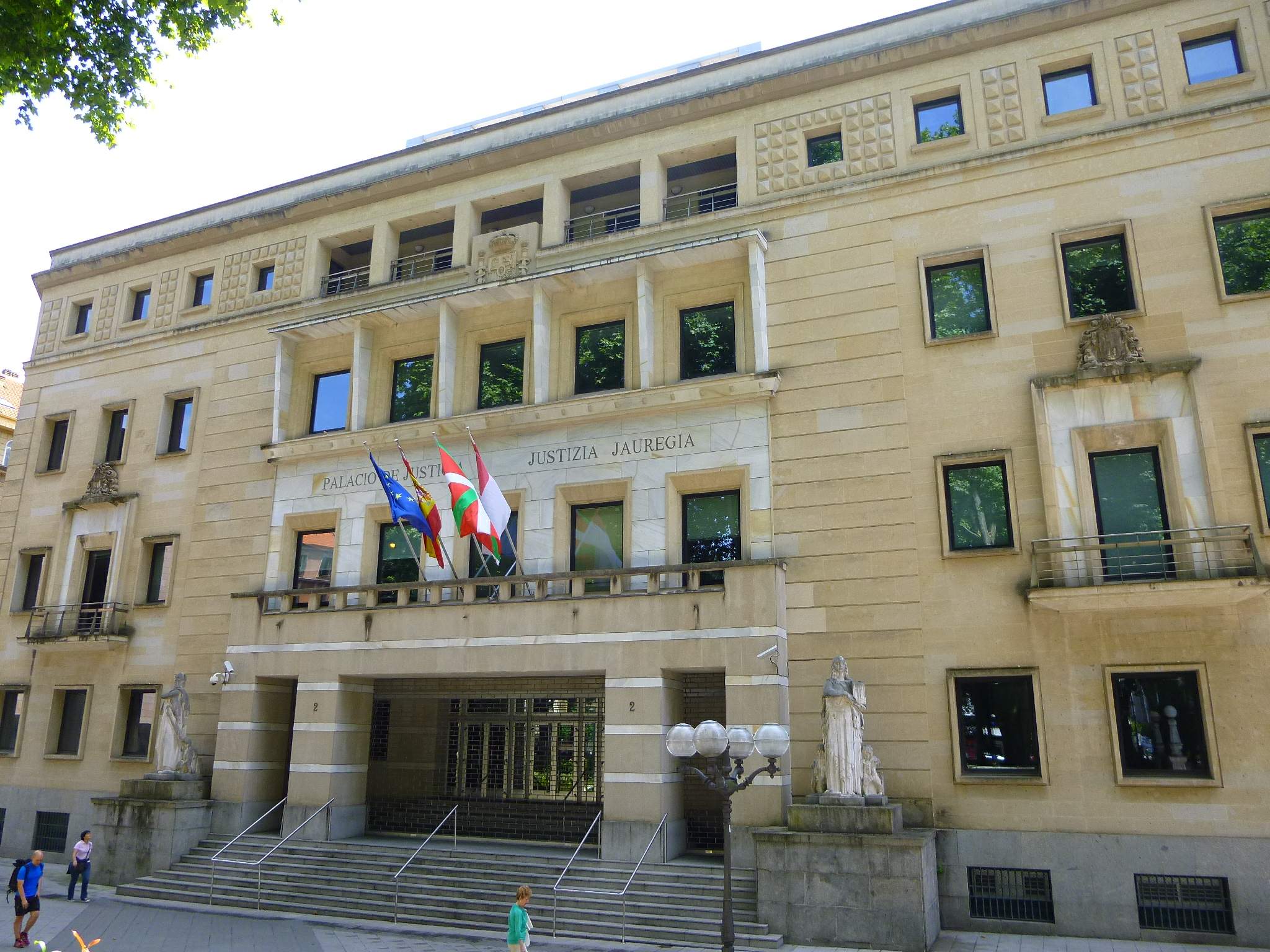
.jpg)
